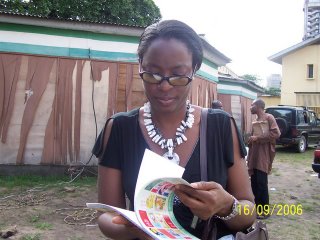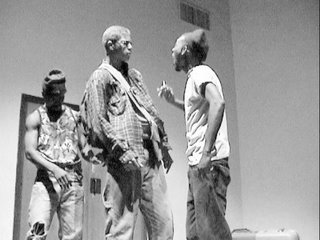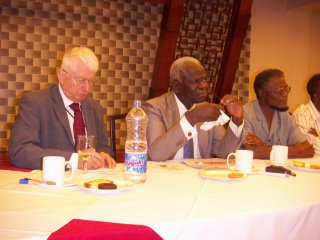The Deconstruction of Idemili
Laspapi's review of the Stage Play-Idemili
Written and Directed by Ahmed Yerima, C.E.O. National Arts Theatre
Performed on Sunday September 17 at Terra Kulture, Victoria Island, Lagos
Published in the Guardian: Sunday September 25
The other-wordly ambience of Terra Kulture was the venue for the second performance of Idemili that this writer would see, the first being at the National Arts Theatre itself in Iganmu. The stage play, written and directed by Ahmed Yerima Ph.D., was presented this time around on Sunday, September 17 by the playwright as his and the National Troupe of Nigeria’s contribution to the 3-day long Annual Lagos Book and Art Festival organized by the Committee for Relevant Art (CORA).
It featured four main cast members, Clarion Chukwura as Ngbeke, a seventy year old mother, Uche Mac-Aulay as Ngborie, her forty year old daughter, Francis Onwochei as Reverend Father ‘Monsignor’ Paul otherwise known as Oheja, the thirty-five year old brother to Ngborie and a younger Sam-Uche Anyamele as Father Emeka.
One of the first points observed was that the two male cast members were prior to Idemili probably much better known for their exploits in the home-video industry and on television rather than on stage; Francis Onwochei as a Television and Movie Producer as well as an actor and Anyamele as the infamous ‘Richard’ in Wale Adenuga’s Super Story Television Series.
The Cast was backed up by dancers and drummers of the National Troupe who performed well but unobtrusively. The set at Terra Kulture was lesser in scale than that used at the National Arts Theatre performance, the stage at Terra being smaller and not as suited to drama. The National Theatre set, constructed in the cinema hall, was a bungalow complete with corrugated iron sheets as its roof and an old bicycle thrown on the roof for good measure, and was beautiful to behold. That architectural feat was not possible at Terra Kulture.
The plot, a conflict of belief systems, revolved around the character, Ngbeke (Clarion Chukwura), an ardent follower of the ‘pagan’ goddess Idemili, whose husband, Ugwuoja, was trapped underground in the mines along with eleven others and whom it seemed certain was sure to become a widow from this incident; Oheja, her son, a convert to Christianity (Catholicism to be particular) who left home fifteen years earlier because his father had slapped him for attempting to overturn the shrine of Idemili. In his long absence from home, he rises to become a Monsignor, a high ranking officer in the hierarchy of the Catholic church; and her daughter, Ngborie, an otherwise healthy-looking Uche Mac-Aulay who has discovered she is infected with the AIDS virus and has come home from the city to die.
As the plot unfolds, we see that Ngbeke, the matriarch, is fixated on Idemili to the point of obsession. She is firmly convinced she knows the cause of all her problems. Her miner husband had been promoted to foreman status and has therefore been tempted to take a second wife. Ngbeke’s call on Idemili to intervene had caused the goddess to trap the miners as a prelude to killing her husband. In Africa, the gods are vengeful.
Ngbeke also remembered that for fifteen years she had been childless, alternating between barrenness and producing still-born children. She had gone to Idemili for assistance and pledged a sacrifice to the goddess if she could have a healthy child and no longer be the butt of jokes from her husband’s family. Shortly after, she gave birth to Ngborie and then to Oheja/Reverend Father Paul. Idemili had promised retribution on Ngbeke for not fulfilling her pledge after begetting her children.
Into this plot comes the young Father Emeka, a junior colleague of Oheja in the Catholic Church, on his way to a punitive bush-posting because of a scandal in a more urban-located church (he is suspected of ulterior motives for attempting to dissuade a couple bent on having a long distance marriage from getting wedded). Father Emeka, who is also a medical doctor and brilliantly played by Anyamele, says all he wants is for his senior, Father Paul to change his negative opinion of him. He leaves after dropping gifts for Father Paul’s family. These gifts include two cockerels.
As one watches the drama unfold, one might wonder the relevance of Father Emeka in the story. Is it just to be the bearer of these two cockerels that play a significant role later on in the drama or is it to highlight the inconsistencies in the church system which even though of ‘divine’ origin has its flaws? It becomes apparent soon after that Father Emeka is much more than the convenient bearer of male chickens. He symbolises the church’s rejection of deviation from conformity. He is a young, good looking, medical doctor who is regularly petitioned against. Father Paul concedes he understands why this might be so, it is because Emeka does not fit the mould of a Reverend Father. Emeka is suspected of seeking a bribe because he counsels a couple against a marriage where the spouses intended to stay thousands of miles apart, a position which anyone with common sense would take. For his logical sequence of thought, his seniors in the church inquire from him who asked him to play God.
Emeka tells Father Paul that he wants to be seen as a man who loves his work, again showing that the ‘new church’ seeks to be given a chance by those who hold rigidly to archaic religious customs which are more befitting of medieval times.
The character of Ngborie, the older sister to the Monsignor, is one that wavers, torn between Christianity and African Traditional Religion. In one breath, she espouses the supremacy of the Christian God and in another, gives a sacrifice of sweets and biscuits to Idemili, the goddess with a sweet tooth, pledging her life in exchange for her father’s. Ngborie in this case, symbolises many Africans, often torn between ‘the traditions of our fathers’ and those of Saints Peter and Paul. The number of African converts to the newer faiths, who visit Traditional Doctors (babalawos to be precise) is enormous. They are of the hazy but firm belief that both the God of the new faith and that of the native doctors must be one and the same, or at the worst, within calling distance of each other. They go to church one day, and the next, travel incredible distances to consult soothsayers, necromancers and diviners in some remote hamlet in ijebu or some other far-flung places.
In reality, even Nigerians in Europe ask their families to help them send made-to-order native doctor packages for a variety of issues: expediting the ‘departure’ of an enemy, good health or promotion and other issues pertaining to advancement of themselves or the detriment of others. Ngborie, after the sacrifice, is suddenly startled into the realization that she is a Christian who has sacrificed to the wrong deity, and it becomes clear there are two cultures warring for supremacy in her. Thereafter, she ’confesses’ to her younger brother, the Monsignor, that she had given what was not hers to give, meaning her life, soon to be terminated by the AIDS virus and therefore not very valuable.
Father Paul otherwise known as the Monsignor, even though only thirty-five years of age symbolises the zealots in Christianity and other modern religions. In his life, there is no room for the acceptance of any other religious practice, and practitioners of other faiths and religious beliefs are pagans and heathen. At the age of twenty, he sought to destroy the shrine of Idemili in his father’s homestead, received a slap for his enthusiasm and promptly departed from home without a farewell, only to return one and a half decades later as a doctor of divinity fully versed in his new faith. The Monsignor epitomises the rigidity of religions like Christianity and Islam which do not yield to substitute or complimentary beliefs. The hybrid practice of many Africans in which they unite their new faiths and traditional practices is anathema to bulwarks of faith like Father Paul.
Still, in the opinion of this writer, it is hypocrisy or a definite lack of direction (which is even more dangerous) that makes men combine faiths. If you do not believe in the Christian or Muslim God, then practice the African Traditional Religion and hold on to it, or no religion at all, if that is your preference. A man wearing a three piece English suit complete with waist-coat, cummerbund and bow-tie, who then wears an agbada on top of it and adds a native cap and slippers, might justly be termed ridiculous. One does not complement the other.
Clarion Chukwura’s portrayal of Ngbeke is a very convincing one. A mother steeped in the ways of her people, she worships Idemili without apology or inhibitions from the beginning of the drama, further adding irony by thanking the goddess for bringing her son back safely, despite the fact that this son is a high priest of the Christian God. She believes in the power of Idemili to give life and take it, attributes given to the strongest deities in any religion around the world.
After pitched and heated debates between Ngbeke and her children, she is convinced by them that the Christian God can save her husband. Ngbeke, desperate for a solution to her predicament, agrees to forego the ways of old, leave Idemili behind forever and face the God of her children. The symbolism is strong in that it is the son who leads the mother to God. As the mother kneels, the Monsignor asks, “Who brings this child to God?” and the daughter replies, “I do”. Here the transference of power is complete and the child has become the one in authority.
This is the same with the advent of Christianity and Islam in Africa, where followers of the old ways were led to the new beliefs by a new generation of religious leaders. The same continues to this day, where the newer faiths continue to convert those who knew the old traditional ways and where even biological children lead their parents to their own faiths. On a wider spectrum, Africa now sends missionaries to Europe where the Christian faith originally came from, showing that the sons are again pointing the way to their parents.
But as a Christian convert, the old woman, Ngbeke, realizes in fear, that she has taken a step that might have consequences. She asks, “What have I done? I have moved from the side of Idemili’s river to the forest of wooden crosses. I have abandoned the shrines of my ancestors on the advice of a child”. The imagery in those lines speaks for itself.
Displaying a conflict and irony that continues in many Africans to this day, she asks the God of her son, Jesus, to release her from her new faith for a few seconds so she may appease Idemili and break free of the debt she owes the goddess. Back to the cockerels. Weighing the two cockerels in her hands, she takes one to the shrine of Idemili, a little to the side of the house, and asks to be freed of the debt. It is notable that if action is frozen on stage at this point, Idemili has a cockerel and her new faith has the other. Is it possible that two systems of belief can stand side by side without friction with enough ‘sacrifices’ to go round? If the action is allowed to continue, we see this is not so, as Ngbeke addresses Idemili and says she would like to be released of her vows and return to the God of her children.
At this time, her daughter runs in screaming in joy and relief, the miners have been rescued, Ngbeke’s husband is alive and well and neither of her children have died.
One question comes to mind immediately. Was it the Christian faith she adopted that saved her husband and kept her children well or was it Idemili freeing her from her vows because she made the long-outstanding sacrifice?
Ngbeke asks the question on all our minds, “Who did it? Was it you, Idemili, or you, Jesus?”
That is the question each individual must ask of his or her own person and thereafter find the courage to stand by the answer.
The cast and crew put up a competent and professional performance which was well received by the audience despite the constraints they had in the light of the limitations at the venue. The actor Francis Onwochei immersed himself in the character of the Monsignor as did his sister in the play, who though, looked much younger than the age of forty years attributed to the character by the writer. Ngbeke also, would not have passed as a 70 year old woman at the Terra Kulture Performance, a feat she achieved easily at the National Arts Theatre.
Idemili however, proved itself to be a well thought-out play with the immense experience of the actors apparent at the performance. The drama succeeds in its purpose in that all who see it are made to reflect and seek answers to that most essential part of human affairs: What does one believe in? Is one a bigot in these beliefs and if so, why is it that way?
Terra Kulture, being one of the few comfortable modern Art venues in the city, might do well to accommodate the growing theatre culture by adapting their hall to suit some of our more demanding large-scale stage plays.
 upcoming Muson Festival when this deterrent on a bucket used for cleaning the grounds, caught my eye. It reads "Stolen from Muson". You'd have to be a die-hard rogue to take that home.
upcoming Muson Festival when this deterrent on a bucket used for cleaning the grounds, caught my eye. It reads "Stolen from Muson". You'd have to be a die-hard rogue to take that home. 
 on her way out of the Festival Grounds on Day 2. Peju's work was one of four discussed at the Festival on the topic: 'what women write'. The others were Splendid by Mobolaji Adenubi, Icarus Girl by Helen Oyeyemi and No Sense of Limits by Araceli Aipoh.
on her way out of the Festival Grounds on Day 2. Peju's work was one of four discussed at the Festival on the topic: 'what women write'. The others were Splendid by Mobolaji Adenubi, Icarus Girl by Helen Oyeyemi and No Sense of Limits by Araceli Aipoh. 
 The Lone Traveller
The Lone Traveller


 First came across this in the library of the Nigerian Law School as a student there. The poet and publisher, Tade Ipadeola, also a student at that time brought this letter published in a book, the title of which I have long forgotten, to my attention. Years later, I sought the picture of James E. Agate on the web.
First came across this in the library of the Nigerian Law School as a student there. The poet and publisher, Tade Ipadeola, also a student at that time brought this letter published in a book, the title of which I have long forgotten, to my attention. Years later, I sought the picture of James E. Agate on the web.


 and edited by Akachi Ezeigbo and Veronica Uzoigwe, Jahman Oladejo Anikulapo (Editor of The Guardian on Sunday, left) chats with the time-tested writer, Mabel Segun. Venue was the British Council, Ikoyi on Thursday the 7th of September.
and edited by Akachi Ezeigbo and Veronica Uzoigwe, Jahman Oladejo Anikulapo (Editor of The Guardian on Sunday, left) chats with the time-tested writer, Mabel Segun. Venue was the British Council, Ikoyi on Thursday the 7th of September. 
